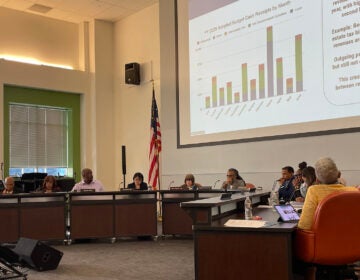Pa. education secretary lauds new federal school accountability law

President Barack Obama signs the "Every Student Succeeds Act," a major education law setting U.S. public schools on a new course of accountability, Thursday, Dec. 10, 2015, in Washington. The law will change the way teachers are evaluated and how the poorest performing schools are pushed to improve. (AP Photo/Susan Walsh)
President Obama last week signed a bill that weakens federal oversight of public schools and transfers autonomy to the states.
Pennsylvania Education Secretary Pedro Rivera says the outgoing No Child Left Behind law was a “cookie cutter” approach that put too much stock in one-size-fits all testing.
Rivera says he’s “extremely pleased” with its replacement, known as the Every Student Succeeds Act.
“By creating the opportunity for states to create a system of accountability and support that can be differentiated based on the needs of students is probably most important,” said Rivera.
That law created a national system that judged schools based on math and reading test scores. Every Student Succeeds erases that system. Instead it lets each state develop its own methods for judging school quality.
The only mandatory standards in NCLB were state standardized tests. Annually, schools either had to raise scores or face escalating penalties.
Under the new law, states still must test students grades 3-8 and once in high school, but it gives states the power to develop their own accountability tools which include other more holistic measures.
Pennsylvania developed its School Performance Profile measuring stick through a federal waiver to NCLB. Still, 90 percent of an SPP score comes from test results.
ESSA makes further waivers unnecessary.
Rivera says his boss, Gov. Tom Wolf, will soon roll out a new method to measure school achievement that he believes will give a much more nuanced look at school performance — one made after getting input from educators, administrators, advocates, lawmakers and parents across the commonwealth.
Rivera says the new accountability system will offer a less punitive atmosphere for schools serving students with special education disabilities and those still learning English.
“[Those students] will still take the tests, but it won’t be the end-all-be-all, the only measurement to access success,” said Rivera.
ESSA still demands that states must separate out test data by subgroup. That provision was the one universally lauded aspect of No Child Left Behind because it brought widespread attention to scores from students that would be lost in school-wide averages.
Some advocates worry, though, about the prospect of putting states completely in the driving seat.
“When states are given unfettered control over education, the civil rights of the most educationally-vulnerable students often go unprotected and academic outcomes actually suffer,” said Maura McInerney, the senior staff attorney of the Education Law Center. “We find that when federal mandates are controlling everything, that there’s a greater likelihood that you’re really addressing the civil rights of all vulnerable student cohorts.”
McInerney is hopeful that Pennsylvania will use its newfound autonomy for the benefit of the state’s most at-risk children. She’s specifically encouraged that ESSA adds and strengthens protections for children who live in foster care, who are homeless, and who’ve been adjudicated.
The new law calls for states to make three of four metrics centered on academic achievement. ELC hopes Pennsylvania will make school climate its fourth measurement, with a specific focus on reducing racial inequities in suspension and expulsion rates.
Nationally, the bill’s passage drew applause from groups holding very different educational ideologies. The National School Boards Association praised the bill, as did the American Association of School Administrators and the American Federation of Teachers.
Philadelphia Federation of Teachers President Jerry Jordan joined AFT President Randi Weingarten at the White House for Obama’s signing.
But despite the support, it’s too early for any one group to claim a major victory. As greater autonomy shifts to the states, so too will contentious education policy debates.
Without any federal influence, states will need to make decisions about funding inequities, teacher performance and training, and the shape of interventions at low performing schools.
The new bill also acknowledges that early childhood education plays a crucial role in closing achievement gaps, but provides only $250 million in federal funds to support preK expansion.
“That’s a drop in the bucket,” said Dominic Gullo, associate dean of research in Drexel University’s school of education. “[Pre-K programs] are not a vaccination against all problems that are going to occur in education, but it’s a beginning of helping us have those students starting school at a much higher level of readiness.”
WHYY is your source for fact-based, in-depth journalism and information. As a nonprofit organization, we rely on financial support from readers like you. Please give today.





